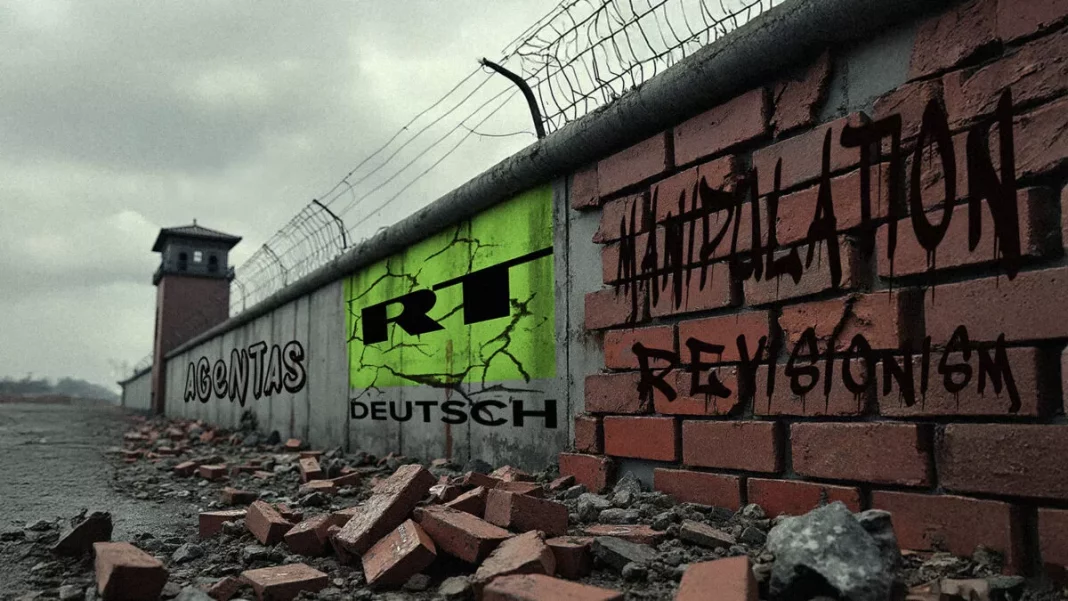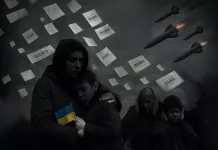By EUvsDisinfo
Information manipulation tends to have specific aims in the here and now: to shift a policy, to confuse voters, to create instability in a society seen as hostile. But sometimes, these aims are best achieved by projecting manipulation into the past. The symbolic dates of 3 October and 9 November are good recent examples.
3 October, a public holiday in Germany, marks the day in 1990 when the Federal Republic of Germany and the German Democratic Republic were reunited in a single state. German unification had been made possible by the fall of the Berlin Wall on 9 November 1989.
But 9 November also marks another occasion, as the pro-Kremlin disinformation outlet RT Deutsch gleefully pointed out last year – the first large-scale anti-Jewish pogrom in Nazi Germany in 1938, known as Reichspogromnacht or Kristallnacht (the Night of Broken Glass).
Memory culture
RT claimed that the ‘red-green memory of the Federal Republic’ had pushed aside commemoration of the end of World War I or Hitler’s beerhall putsch in 1923 – both of which also took place on 9 November – in order to exclusively focus on the events of 1938. Moreover, according to RT, 9 November was now being put at the service of a new concern – to justify German support for Israel following the Hamas attack of 7 October 2023.
RT quoted German Foreign Minister Annalena Baerbock as writing on X last autumn: ‘It remains our everlasting obligation to ensure that Jews in Germany can live openly and without fear. It is the responsibility of all of us to shape our present from an awareness of our past. Never again is now.’
This sentiment was echoed by some of Baerbock’s party colleagues from Saxony, who commemorated both the victims of Kristallnacht and Israelis attacked by Hamas.
The manipulative RT article questioned what commonality existed between these two events and criticised this association as a form of historical relativism, arguing that they were fundamentally different in nature and context. The author – perhaps in an act of projection of his own – suggested that such comparisons diluted the specific historical significance of Kristallnacht and served contemporary political agendas rather than genuine remembrance.
Multiculturalism no more?
The RT piece also highlighted an alleged shift in the Greens’ stance on immigration and Islam since 2015. According to the piece, the Greens – initially welcoming towards refugees – have been forced by recent events to move towards a more critical position towards Islamism, aligning to some extent with right-wing sentiments.
Another RT German article harshly criticised Chancellor Olaf Scholz and other German politicians, whose speeches on the Day of German Unity in 2024 were described as empty rhetoric. Scholz’s statements about diversity and democracy, in particular ‘Our internal diversity is not a deficit—it is a strength’, were framed as clichés that fail to acknowledge the deep divisions in German society.
The author sarcastically questioned whether this emphasis on ‘diversity’ extended to the tolerance of differing political opinions, suggesting that dissenting voices are being marginalised in Germany under the guise of promoting unity.
The notion of ‘unity in freedom’ frequently heard in political speeches was framed as a euphemism for an increasingly uniform, one-dimensional political discourse.
Deceptive wording: annexation instead of reunification
In the end of September, RT Deutsch claimed that German unification was just the annexation (Anschluss) by the Federal Republic of Germany’s of the GDR.
RT seeks to give the impression of something similar to that of Nazi-German / Austria in 1938 by using the infamous word ‘Anschluss’ in this context instead of reunification (Wiedervereinigung).
This deceptive wording totally omits the democratic process and important milestones after the fall of the Berlin wall in 9 November 1989. The first free multiparty elections in East Germany held 18 March 1990. Then the negotiations between the two countries resulting in a Unification Treaty. The calm and orderly dissolution of the German Democratic Republic and ratification of the Unification Treaty in the German parliament on 3 October 1990.
German unification: a tool to maintain ‘American dominance‘?
Not content with merely questioning politicians’ rhetoric, RT Deutsch also sought to discredit the very fact of German unification.
Earlier in September, it interviewed none other than the GDR’s last leader, Egon Krenz – a figure of ridicule in his own time, with no influence in German post-1990 politics.
In the interview, Krenz parroted standard Kremlin talking points: The Cold War did not truly end with the fall of the Berlin Wall in 1989 but continues because of US ambition to maintain its global dominance; the US is seeking to weaken Russia and prevent strong ties between Germany and Russia; German unification was merely a means to push Soviet forces out of Central Europe, part of this long-standing agenda.
In comparing past German leaders with Chancellor Scholz, Krenz lamented a departure from diplomatic engagement, replacing it with alleged militarisation. Krenz claimed that earlier leaders such as Helmut Schmidt sought negotiation and dialogue with Soviet counterparts while Scholz was in alignment with US military strategies, engaging in ‘militaristic’ rhetoric and policy.
Instead, Krenz called for a renewed focus on ‘peace’ and ‘cooperation’ with Russia, echoing sentiments from historical figures such as Otto von Bismarck, who had warned against German antagonism towards Russia.
In sum, these RT German pieces question the meaning of 9 November and how German unification is being commemorated in contemporary politics in Germany. They shed doubt on the historical accuracy of the parallels being drawn between distinct events in an effort to address current issues related to anti-Semitism, violence, immigration, and the European position towards Russia.
While not immediately apparent as disinformation, the cumulative effect of such assertions is clear enough: a wholesale rewriting of recent history, at the service of contemporary agendas.
By EUvsDisinfo





